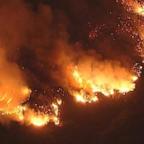Central Park and Philly could break no rain records
The Northeast and Mid-Atlantic regions are experiencing an unprecedented dry spell, raising concerns of fire danger.
Central Park in New York City is also facing an unusually dry October. The world-renowned landmark has seen zero rainfall this month. Since record-keeping began in 1869, there has never been a month in Central Park that didn't have some rainfall. With no rain in the forecast through the end of the month, this could be a first.

Similarly, Philadelphia is on the brink of shattering its record for the longest period without rain, reaching 25 days as of Oct. 24. If the city doesn't receive any precipitation by the end of Monday, Oct. 28, it will surpass an historic 29-day dry streak, the current record. Records go back to 1871.
As a result of these near-record dry conditions, fire danger levels have surged. Elevated warnings stretch from Massachusetts to Virginia, with humidity levels plummeting to around 30% and gusty winds of nearly 30 mph. New Jersey is particularly vulnerable, with most of the state under a Red Flag Warning, indicating a high threat of wildfires. The combination of low moisture and wind creates an environment ripe for the spread of any fire, making it crucial for residents to remain vigilant.
-ABC News meteorologists Max Golembo and Kenton Gewecke and ABC News Climate Unit's Matthew Glasser






